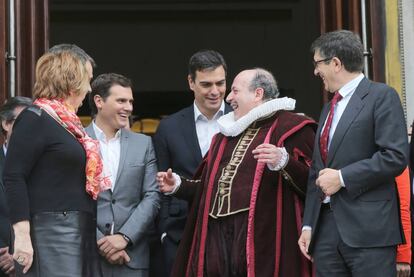Cervantes celebrations take over Spanish Congress
Country observes the death 400 years ago of the author of ‘Don Quixote’ with films and events

The ring announcing the start of Thursday’s session in Congress was followed by another, very different sound.
It was the sound of violins, violas, cellos, a harpsichord and a double bass belonging to La Spagna orchestra, which played fragments from Georg Philipp Telemann’s Suite Burlesque de Quixotte.
The actor Manuel Tallafé, dressed as the writer himself, took over the house speaker’s seat to address the chamber
Actors and musicians filled Spanish Congress to observe the 400thanniversary of the death of Miguel de Cervantes. The actor Manuel Tallafé, dressed as the writer himself, took over the house speaker’s seat to address the chamber.
For once, every seat in the house was full – even those assigned to the acting government of the Popular Party, whose members have been conspicuously absent during question times these last few months.
There was one notable absence, that of acting Prime Minister Mariano Rajoy. Socialist leader Pedro Sánchez arrived a few minutes late, and shared a row with Ciudadanos chief Albert Rivera.
The actors took the opportunity to pepper their rhetoric with satirical criticism aimed straight at the politicians sitting in the room. Cervantes-Tafallé even joked with the idea of registering his new novel Don Quixote in Panama.
The theater company Ron Lalá ended the special event with a line from its touring show, Cervantina, which resonated in a chamber where politicians have been unable to form a new government four months after Spaniards went to the polls: “España está agonizante, España se va al abismo. Todo el mundo lee a Cervantes para pensar por sí mismo.” (Spain is agonizing, Spain is headed for the abyss. Everyone is reading Cervantes in order to think for themselves).
A documentary about his remains
On Thursday, a new documentary about Cervantes was presented at the Spanish Film Academy coinciding with the anniversary of the author’s death 400 years ago.
The film follows the efforts to locate and identify the remains that were found recently at a former convent in downtown Madrid, where Miguel de Cervantes Saavedra was buried unceremoniously after dying poor.
Cervantes, la búsqueda (or, Cervantes, the search) illustrates the search that was carried out by scientists and historians at the Convento de las Trinitarias. “The idea emerged from the need to reflect all the research, effort and work of a group of scientists,” said film director Javier Balaguer.
English version by Susana Urra.
The Shakespeare connection
The fact that Shakespeare and Miguel de Cervantes died nearly simultaneously (although there is a 10-day difference because both countries were using different calendars) spurs us to seek a shared identity in these very different beings.
From a historical viewpoint, their realities were notoriously different. Shakespeare's England transitioned from a period of imperial ambitions to one of mostly domestic concerns, as reflected in works such as Hamlet or Julius Caesar on one hand, and King Lear on the other.
Cervantes' Spain held sway over part of the New World "with an insatiable greed and ambition that were the biggest possible," in the words of Father Bartolomé de las Casas. By expelling Jews, Arabs and later converts, Spain tried to create a pure Christian identity that denied its mixed roots. In such a setting, Don Quijote was a subversive act because it had a character who was a Moorish convert to Christianity railing against the infamy of the expulsion methods.
One lived in the shadow of the Reformation, the other of the Counter-Reformation. One was a master of a popular genre that carried little prestige: plays. The other was a master of another popular genre that was additionally prestigious. Both used the means at their disposal to create brilliant, enlightened works without knowing that they were so.
Did they ever meet? We may suspect that Shakespeare had news of Don Quijote and that he either read it, or at least read the episode about Cardenio.They probably never met, but if they did, it is possible that neither man recognized in the other a figure of universal relevance, or maybe neither was willing to admit the possibility of another star of equal brilliance as themselves.
When Joyce and Proust met, they exchanged three or four platitudes: Joyce complained about his headaches and Proust griped about his stomach trouble. Perhaps a meeting between Shakespeare and Cervantes would have been similar.
Tu suscripción se está usando en otro dispositivo
¿Quieres añadir otro usuario a tu suscripción?
Si continúas leyendo en este dispositivo, no se podrá leer en el otro.
FlechaTu suscripción se está usando en otro dispositivo y solo puedes acceder a EL PAÍS desde un dispositivo a la vez.
Si quieres compartir tu cuenta, cambia tu suscripción a la modalidad Premium, así podrás añadir otro usuario. Cada uno accederá con su propia cuenta de email, lo que os permitirá personalizar vuestra experiencia en EL PAÍS.
¿Tienes una suscripción de empresa? Accede aquí para contratar más cuentas.
En el caso de no saber quién está usando tu cuenta, te recomendamos cambiar tu contraseña aquí.
Si decides continuar compartiendo tu cuenta, este mensaje se mostrará en tu dispositivo y en el de la otra persona que está usando tu cuenta de forma indefinida, afectando a tu experiencia de lectura. Puedes consultar aquí los términos y condiciones de la suscripción digital.








































